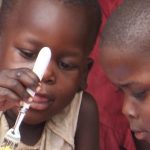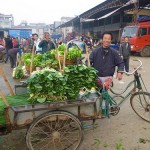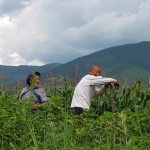DFID’s support of IFPRI has enabled researchers to produce landmark work confirming that early nutrition matters for development later in life. Specifically, IFPRI’s research has shown that investing in preschool nutrition has long-term positive health and economic impacts—and that failing to invest can wreak long-term damage. In 2006, IFPRI determined that undernourished preschoolers in Zimbabwe >> Read more
Ethiopia’s Productive Safety Net Programme: Enhancing people’s resilience
Ethiopia is one of the poorest, most populous, and largest countries in Africa. It has suffered challenging conditions over the past several decades—such as the 1984 drought combined with civil war that resulted in a catastrophic famine. Over the years, Ethiopia has received a large share of Africa’s emergency food aid. In 2005, the Government >> Read more
HarvestPlus: Reducing micronutrient malnutrition
Since 2004, alongside 70 partner organizations in more than 40 countries, HarvestPlus, which is supported by several transformational donors including the United Kingdom’s Department for International Development (DFID), has sought to reduce micronutrient malnutrition through biofortification. This means conventionally breeding staple food crops with higher levels of key micronutrients—namely, iron, vitamin A, and zinc—identified by >> Read more
IFPRI & DFID: 30 years of Making a Difference
IFPRI’s work in providing cutting-edge research on food and nutrition security has long depended on strategic partnerships with donors, universities, research organizations, and others around the world. One of the Institute’s key collaborators is the United Kingdom’s Department for International Development (DFID), which has served as a strategic and collaborative donor and partner to IFPRI for more than 30 years.
HarvestPlus China
Using innovative ways to fight this “hidden hunger,” HarvestPlus-China contributes to knowledge and technology transfers across research institutions and implementing agencies in both developed and developing countries.
China Strategy Support Program and the International Center for Agricultural and Rural Development
Chinese policymakers are increasingly learning from other international development actors and sharing their own experiences as they design agriculture strategies and poverty-reducing programs. To enhance these collaborations and meet government demand for policy-relevant knowledge, IFPRI launched its China Strategy Support Program in 1996 and subsequently established the International Center for Agricultural and Rural Development (ICARD) in 2003 together with the Chinese Academy of Agricultural Sciences.
- « Previous Page
- 1
- …
- 4
- 5
- 6
- 7
- 8
- …
- 11
- Next Page »



